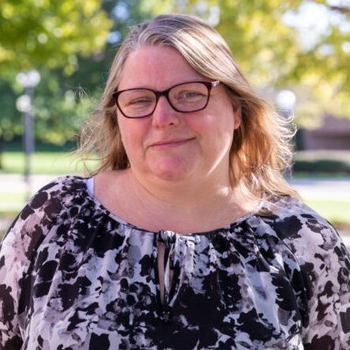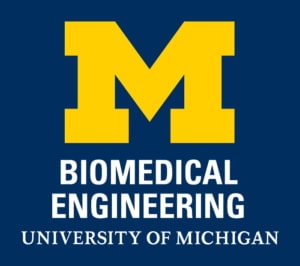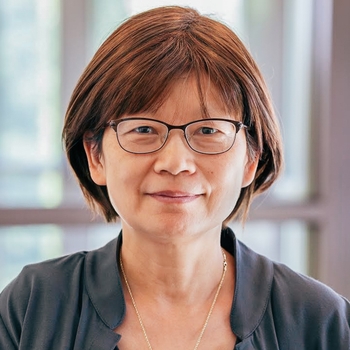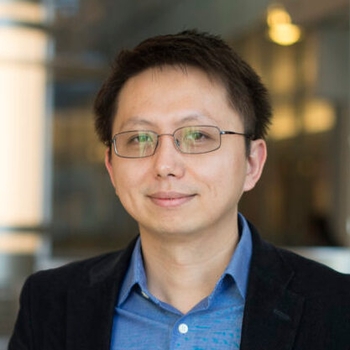Graduate Academic Advising
Seeking Answers to Questions on Your Degree Journey
All undergraduate and graduate student forms are now available on the BME INTRANET in the Student Resources > Forms section. You will need to log in using your M+Google (Level 1) account. If you are unable to access these files please contact [email protected] for assistance.
Graduate Advising Contacts
Master’s Advisor (MS/MSE/MEng)

Tara McQueen
Master’s/SUGS Coordinator
734-647-1091
Ph.D. Advisor/Program Coordinator

Maria Steele
Graduate Coordinator
734-647-1091

Jan Stegemann
BME MEng Program Director
734-764-8313

Cheri Deng
BME MS/MSE Program Director
734-936-2855

Zhongming Liu
Associate Chair for Graduate Education
Dr. Liu chairs the Graduate Education Committee, which is composed of the graduate program concentration advisors. He is also responsible for other aspects of overseeing the graduate program, with a focus on Ph.D. students.
Graduate Programs
Graduate advisors by concentration
Bioelectrics and Neural Engineering
Bioelectricity is the study of electrical fields and potentials within the body. In the bioelectrical concentration students learn how to examine and control these fields towards developing medical devices and restorative therapies. The core classes within this concentration focus on 1) examining nerve and cardiac bioelectrical fields from a computational standpoint and 2) understanding techniques to model neurons and to stimulate and record from individual and large populations of neurons. Electives within this concentration include courses on medical imaging, systems-level neuroscience, and introductions to microelectronics and signal processing. Students graduating from BME with a bioelectrical concentration will be able to work as engineers in the rapidly expanding fields of neural engineering, medical diagnostics, and medical systems industries, or pursue advanced degrees in medicine, basic medical sciences, or bioelectrical engineering.
Enrico Opri, Ph.D.
Assistant Professor, Biomedical Engineering
Email: [email protected]
Research Areas: Biomedical Computation and Modeling, Neural Engineering
Biomaterials and Regenerative Medicine
Biomaterials is the study of interactions between living and non-living materials. Students trained in biomaterials must have a thorough understanding of the materials they work with and properties of the biological system they seek to replace or regenerate. Biomaterials are also an integral component in tissue engineering and regenerative medicine. Biomaterials research areas include: design of orthopaedic, dental, cardiovascular and neuro-sensory prostheses, artificial organs, blood-surface interactions, cellular and tissue engineering, drug delivery, biosensors, microencapsulation technology, and implant retrieval analysis. Students graduating from BME with a concentration in biomaterials will be capable of working in the medical device, tissue engineering or pharmaceutical industries, academic or government laboratories, or pursuing further education in Ph.D. or professional programs.
Andrew Putnam, Ph.D.
Professor, Biomedical Engineering and Cardiovascular Medicine
2204 Lurie Biomedical Engineering
1101 Beal Avenue
Ann Arbor, MI 48109-2110
Phone: (734) 615-1398
Email: [email protected]
Research Areas: Biomaterials, Biomechanics, Cardiovascular, Molecular and Cellular Biomechanics, Skeletal Orthopaedics, Tissue Engineering and Biomaterials, Tissue Engineering and Regenerative Medicine
Biomechanics and Biotransport
Biomechanics is a hybrid discipline requiring a thorough understanding of classic engineering mechanics, physiology and cell biology, and the interface between the two. Biomechanics also has important applications in cutting-edge fields like tissue engineering and mechanotransduction. In tissue engineering, one tries to regenerate new tissues to replace defects in existing tissue. This requires knowledge of tissue-mechanical function. Mechanotransduction is the study of how cells sense and react to mechanical stimulus, a field with applications in such diverse areas as hearing (haircell movement in fluids) and orthopaedics (bone and tendon response to physical stress). Graduates in this concentration will be prepared for a wide range of industries concerned with mechanical effects on the human body including surgical device industries, automotive safety, and biotech industries concerned with mechanically functional tissue. Students will also have excellent preparation to attend medical school or pursue a Ph.D.
David Kohn, Ph.D.
Professor, Biomedical Engineering
Professor, Dentistry
2154 Lurie Biomedical Engineering
1101 Beal Avenue
Ann Arbor, MI 48109-2110
Phone: (734) 764-2206
Email: [email protected]
Research Areas: Biomaterials, Biomechanics, Drug Delivery and Therapeutics, Organ and Whole Body Biomechanics, Tissue Engineering and Biomaterials, Tissue Engineering and Regenerative Medicine
Biomedical Imaging and Ultrasonics
Since the invention of x-ray computerized tomography more than 25 years ago, imaging has become the primary noninvasive diagnostic tool available to the clinician. Although many principles are common to all imaging modalities, biomedical imaging scientists and engineers must understand the basic physics and operating principles of all primary modalities including magnetic resonance imaging (MRI), radiography and nuclear medicine, optics, and ultrasound. Major biomedical imaging companies require such multi-modality expertise to design new devices and procedures. In addition, clinical problems increasingly require the techniques of cell and molecular biology to design both new contrast agents and imaging methods for a wider range of applications. The biomedical imaging curriculum recognizes trends and requires students to have a solid background in signal processing and imaging science, and simultaneously be literate in both the basic life sciences and the basic operating principles of several imaging modalities. Graduates of this program will be well prepared to work in the medical imaging industry, to attend medical school, or to study for a Ph.D. in BME.
Zhongming Liu, Ph.D.
Associate Professor, Biomedical Engineering, and Electrical Engineering and Computer Science
2119 Carl A. Gerstacker Building
2200 Bonisteel Boulevard
Ann Arbor, MI 48109-2099
Email: zmliu@umich.edu
Research Areas: Biomedical Computation and Modeling, Biomedical Imaging, Biomedical Imaging and Optics, Neural Engineering, Neurological Disorders
Biotechnology and Systems Biology
Advances in cellular and molecular biology have changed and expanded the ways therapeutic devices and drugs are designed. Modern biotechnology depends on scientists and engineers who study the fundamental properties of cell, molecular, and tissue biology, and apply these to engineer materials and technology to interact with living systems. Goals include the production of improved biomaterials for medical implants and prosthetics, tissues engineered for specific functionality, and new therapeutic drugs. The biotechnology curriculum emphasizes critical areas of chemistry, molecular biology, and cell biology, but also exposes students to a broad range of engineering approaches necessary for this interdisciplinary field. Graduates of this program will be well prepared for jobs in the pharmaceutical or medical device industries, to attend professional schools, or to study for a Ph.D.
Paul Jensen, Ph.D.
Assistant Professor, Biomedical Engineering
Email: [email protected]
http://jensenlab.net
Research Areas: Biomedical Computation and Modeling, Engineering Education